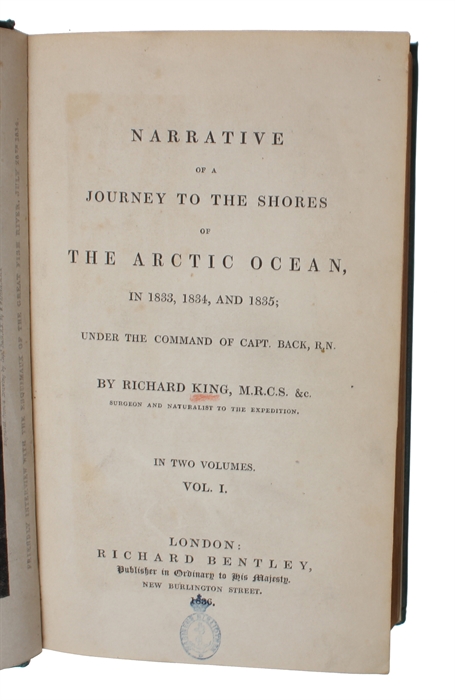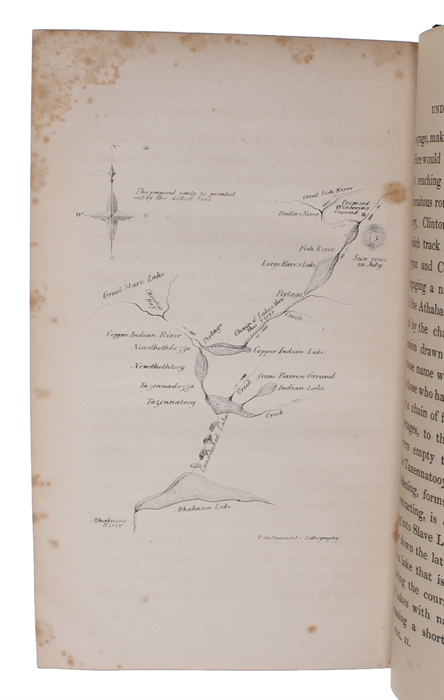KING’S IMPORTANT NARRATIVE OF BACK’S 1833-1835 ARCTIC EXPEDITION
KING, RICHARD.
Narrative of a Journey to the Shores of the Arctic Ocean, in 1833, 1834, and 1835; under the Command of Capt Back, R N. 2 vols.
London, Richard Bentley, 1836.
8vo. In one later full green cloth binding with black leather title-label with gilt lettering to spine. Stamps to front end-papers and small stamp to title-page, otherwise a fine copy. XV, (1), 312, (1); viii, 321, (1)pp.+ 4 plates [2 frontispieces, a map and a plate depicting two "Arctomys Okanaganii"]. Without half-title in vol. I (not called for in vol. II).
Rare first edition of Dr. King's narrative of his travels under Captain Back in the Arctic Ocean in the mid 1830ies, a work praised for its more sanguine view of the expedition compared to that of his commander.
Shortly after qualifying as a medical man, King obtained the post of surgeon and naturalist in the expedition led by Captain George Back to the mouth of the Great Fish River (now known as the Back River) between 1833 and 1835, in search of Captain John Ross. He took a prominent part in the expedition, and is frequently mentioned in Back's Narrative (1836).
King generally described the Back expedition as a series of missed opportunities - an implicit argument for recognition of his own contribution: "King 'had a much more arduous share of the work than Back and was largely responsible for the success of the expedition', and felt that yet more could have been achieved, had it been better led. King makes these criticisms in his account, which was published in late 1836, and, as one would expect, contains material published in Back's narrative; however, 'King's is in many respects the better book, since he showed a far deeper understanding of the indigenous peoples of the Arctic and did not indulge in dramatic exaggeration" (ODNB).
"King, surgeon and naturalist of the Back expedition that descended the Back River to the arctic coast of Canada, includes much material similar to that contained in Sir George Back's Narrative of the Arctic Land Expedition, 1836, with additional detail on birds, mammals, and fishes, especially as observed near Fort Reliance" (Arctic Bibliography).
"Dr. King's narrative is full of the details of Indian life, as it was presented to the members of Captain Back's expedition. He looked at the same transactions with the natives, and the same phases of their character which Captain Back portrays, from a different point, and their coloring to his eye bears another tinge. His journal, filled with descriptions of interviews with the Chippewyans, Crees, Dog-Ribs, and Esquimaux, is therefore exceedingly interesting even after the perusal of Captain Back's narrative. Although every chapter is largely devoted to incidents associated with the natives, and anecdotes illustrative of their character, Dr. King yields the whole of Chapter xii. to an examination and relation of the present condition of the tribes inhabiting the Hudson's Bay territories. The Doctor does not attempt to conceal the chagrin he felt, at the cool absorption of his own careful researches in the narrative of Captain Back. In the splendid work of that really eminent explorer, there appears a little, and but a little of that want of generosity which the relation of Dr. King insinuates. Both give the most minute narrations of the peculiar traits of the Northern Indians, their destructive wars, their wasting from disease, and famine, and debauchery, all of which are directly traceable to their communication with the whites. Dr. King, however, finds in them traces of some of the nobler, as well as the more tender emotions, the possession of which Captain Back somewhat superciliously derides. Dr. King very justly reminds him that the gallant Captain owed his life, and that of his entire party, to the devotion and self-denial, through two long starving winters, of the Chippewyan chief Akaitcho. This remarkable Indian deserves an honorable fame. While his tribe in common with himself were starving, he shared with Captain Franklin in his two expeditions, and with Captain Back in a third, the scanty food, which his superior hunter-craft enabled him to obtain, when the duller white reason failed. Captain Franklin would never have sailed upon his fateful voyage, but for the humanity of Akaitcho, as he would have perished of starvation on his first exploration" (Field).
Arctic Bibliography 8708
Field 831
Sabin 37831 (erroneously calling for 7 plates)
Staton and Tremaine 1899
Wagner-Camp 62.
Order-nr.: 54127



